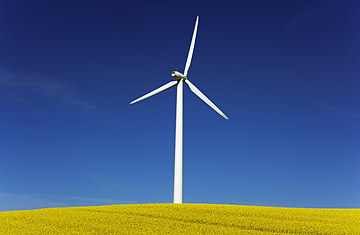
Environmentalists can't decide whether to celebrate the recession or dread it. Conventional wisdom holds that the green movement will be one of the first casualties of the downturn. "The clean-tech industry is at risk because of a real lack of access to capital," says Paul Maeder, who helps oversee clean-tech investments for Highland Capital, the global venture-capital firm he co-founded. But in his next breath, Maeder explains why the current economic mess may end up being a boon to environmentalism — by forcing change. "We're in a crisis because of oil prices and climate change, and now we're in a crisis because of the capital markets," he says. "This is where innovation happens — where the existing power structure hits a crisis point. I'm really happy."
There's a fine line between optimism and denial. The WilderHill New Energy Global Innovation Index, which tracks the stock prices of clean-tech companies, is down about 80% since the beginning of September. (By contrast, the S&P Index lost about 25% of its value over the same time period.) The cost of oil, which has driven much of the investment in alternative energy in recent years, has halved since the summer. And new green industries, like wind farms and solar-panel factories, are no less affected by the credit crunch than any other business.
Even in Europe, which has been the world's leader in carbon-cutting, some governments appear to be using the financial situation as an excuse to stand down. In March 2007, European Union members pledged to cut greenhouse-gas emissions 20% below 1990 levels by 2020 — but that was back when the Dow was 25% higher than it is today. Several European nations, including big industrial producers like Germany, are now saying the target is unrealistic, and at an E.U. summit on Oct. 16, some Eastern European countries, which are poorer and more dependent on fossil fuels than their neighbors, called for the Continent to pull back from goals that include cutting energy consumption 20% while increasing the share of energy from renewables 20%. To some degree, Europe is simply coming to grips with the potential cost of its green dreams — up to $100 billion a year by 2020, according to a study by the think tank Open Europe. Still, says Italian Prime Minister Silvio Berlusconi: "We do not think that now is the time to be playing the role of Don Quixote."
Problem is, the essential issue addressed by clean-tech development has less to do with the economy than with climate change, dependence on foreign oil and energy waste — all long-term threats. If green tech will be to the 21st century what high tech was to the last, then this is no time to scale back. With investors rightly spooked, however, governments on both sides of the Atlantic need to show more leadership. "Seen in the right way, people can learn important lessons from [the crisis]," says Nicholas Stern, the British economist whose 2006 report laid out the financial merits of tackling climate change. "Low carbon growth will be a very important engine of growth over the next 20 years or so."
With the United Nations' annual climate-change summit set for Poland in December — less than a month after the U.S. elects a new President — European leadership will be more important than ever. Overall, the political will seems intact: in the face of strong opposition from energy-intensive industries, the environment committee of the European Parliament earlier this month voted to require most electric utilities to buy all their carbon permits after 2012. (Currently, most European governments give their permits away; selling them should speed carbon reductions and boost alternative-energy development but will cost more.) Those proposals still need to be voted on by the full European Parliament and individual governments. But French President Nicolas Sarkozy, who currently holds the rotating E.U. presidency, insists the goals will be met. "Climate change is so important that we cannot use the financial and economic crisis as a pretext for dropping it," he says. In Britain, where Prime Minister Gordon Brown has been a leader on climate change, Parliament passed an ambitious law on Oct. 28 that commits the country to cutting carbon emissions 80% by 2050.
Even if Europe pulls back, the U.S. may be able to pick up the slack. Both presidential candidates support a national carbon cap-and-trade system, similar to that in place in Europe, and Barack Obama has pledged to invest $150 billion in clean tech over 10 years if he's elected President. The recent economic bailout leaves the next Administration with less to spend, but Obama at least thinks green investment will create new industries and jobs that can't be outsourced. He told TIME's Joe Klein that energy will be his No. 1 priority if he enters office, and Obama's energy adviser, Jason Grumet, has said that if Congress fails to pass a national cap-and-trade bill, a President Obama might regulate carbon dioxide directly through the Environmental Protection Agency. "The stage is set for a wholesale change in the way the U.S. approaches climate change," says Terry Tamminen, former environmental adviser to Governor Arnold Schwarzenegger and director of the climate-policy program at the New America Foundation.
A global recession will clearly take some air out of the green-investment bubble. FPL Group, the largest operator of wind power in the U.S., just announced that it would cut back on new turbines, while Germany's Schott Solar, one of the oldest solar-power companies in the world, pulled out of a planned $900 million initial public offering. But popping the bubble might not be a bad thing if the tougher economy forces the clean-tech industry to make better use of its resources. It may emerge even stronger from the crisis. "Change is good for start-ups and bad for the establishment," says Maeder. "I like change. I think this is a huge opportunity."
— With reporting by Leo Cendrowicz / Brussels and Eben Harrell / London
